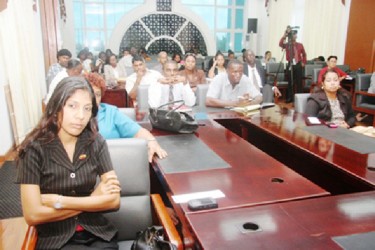The Human Services Ministry is to construct a shelter to house victims of human trafficking as the government intensifies efforts to combat the illicit trade, the Government Information Agency (GINA) has reported.
The shelter is expected to house victims of trafficking as well as provide them with the necessary life skills and other training opportunities to go on to lead productive lives, GINA said on Wednesday, while reporting on the opening of a three-day workshop on human trafficking, organized by the Human Services Ministry

and the United Nations Development Programme (UNDP).
The U.S State Department’s most recent report on human trafficking in Guyana had noted that longer term shelter and protection is not available, thereby putting victims at risk of traffickers’ reprisals since the government failed to punish most trafficking offenders with incarceration. In a response, the Ministerial Task Force on Trafficking in Persons had said Guyana has never had an experience where a person who was allegedly trafficked suffered reprisal. “However, there is provision for long term shelter and protection for alleged victims of trafficking in persons, if they so request. Long term shelter is provided by Help and Shelter,” it noted.
GINA said that 50 trainers, who will eventually go to train others in various regions, are to be equipped with skills on facing Trafficking in Persons (TIP) by the conclusion of the workshop, being held at the Guyana International Conference Centre.
TIP is a US$32 million global industry, and the second largest income earning criminal enterprise behind the drug trade, a rating it shares with the illegal arms trade. Women and children are the primary targets in this trade which constitutes a “serious violation of human rights.”
It is against this backdrop that Human Services Minister Jennifer Webster called for “a more robust response through partnership” at the opening of the workshop, GINA stated.
It noted that the need for such endeavors has resulted in collaborative efforts launched between the government and non-government agencies, such as the Guyana Women Miners Organisation (GWMO) and Help and Shelter. At the end of the workshop today, the GWMO is expected to be provided with a small grant to assist with its operations. Just recently, the group rescued several women and girls who were being held their will in mining communities.
GINA reported Webster as saying that “we are seeking to ensure that all our citizens in Guyana are made aware of the importance of the issue of TIP…our government will spare no efforts to ensure that any reports of TIP are thoroughly investigated and perpetrators brought to justice.”
Meanwhile, Home Affairs Minister Clement Rohee reportedly stated that “once an allegation of human trafficking can be proven by incontrovertible evidence, the perpetrators will be dealt with condignly.”
For the year, there have been six reports and three convictions of traffickers and persons related to the trade in Guyana’s court system even as criticisms about a lag in the court systems have been leveled.
Noting these criticisms though, Rohee was reported as saying that police are constantly being urged to be more aggressive in dealing with such files sent to the DPP, and to prepare such files with meticulous precision so as to enhance chances of successful prosecutions. He added though, that the political executive has “absolutely no control of the judicial system,” and therefore is unable to affect how their work is carried out.
Despite this reality Rohee said that the government established task force on TIP, which he chairs, is a testament to the government’s commitment to addressing the issue. The membership of the task force was recently expanded to include representatives from the Chambers of the Director of Public Prosecutions (DPP)
Such initiatives, he said, should make it “pellucidly clear” that there is no equivocation on the subject if TIP, and that the policy of the Guyanese government “is to wage a consistent struggle against human trafficking.”
According to GINA, Guyana’s efforts were lauded by representatives of several organisations during the workshop launch. Deputy Chief of Mission at the United States Embassy Bryan Hunt was reported to have recognised Guyana’s efforts while urging for the consideration on the three ‘P’ paradigms (Protection, Protection, Prosecution) with regards to human trafficking.
Hunt said, “This year the Government of Guyana has made significant advances and delivered a severe blow to human traffickers,” while UNDP Resident Representative Khadija Musa is reported to have reaffirmed the support of her organisation to the fight against this scourge and spoke of the importance of recognising the signs of human trafficking. GINA quotes her as stating that, “often people are not aware that victims of TIP are living in their communities.”
Chief Mission of the International Organisation for Migration (IOM) Rui Reis, noting that joint efforts are essential, pointed out the need for countries to work together since working in isolation is insufficient to address a problem of this scale.





